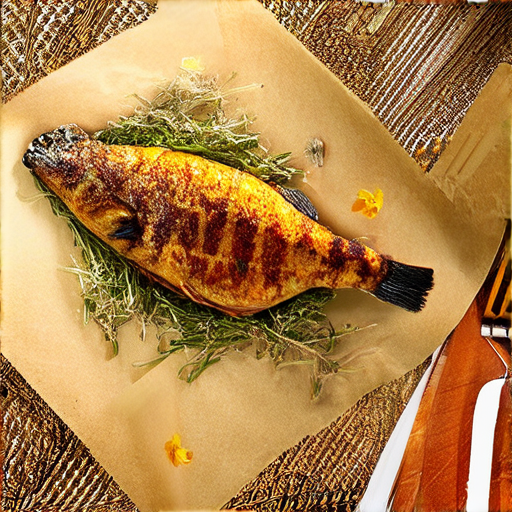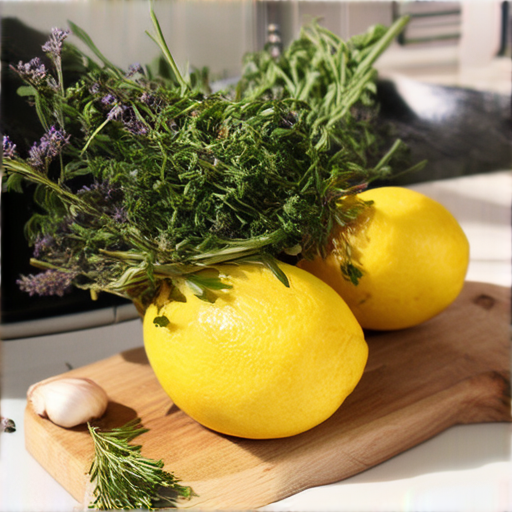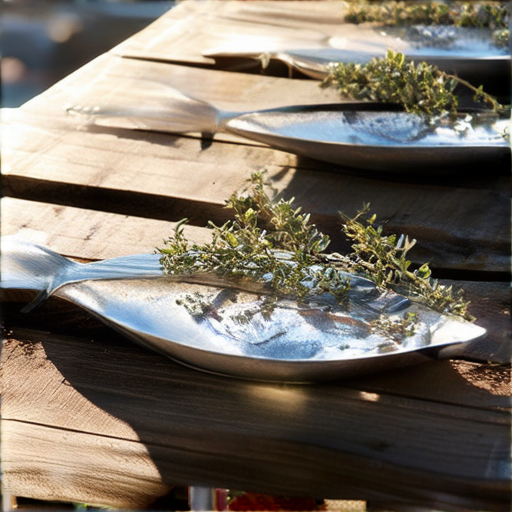When it comes to cooking fish, few methods are as elegant and flavorful as herb-roasted fish. This technique involves combining fresh herbs with high-quality fish and roasting it to perfection, resulting in a dish that is both visually stunning and packed with flavor. In this article, we’ll explore the world of herb-roasted fish recipes, covering everything from choosing the right herbs and fish to mastering the art of seasoning and presentation.

Herbs That Go Well with Fish
Dillweed, parsley, garlic, celery, paprika, and ginger are popular herbs and spices that complement the delicate flavor of fish.
- Dillweed: A classic pairing for fish, dill adds a bright, citrusy flavor that enhances the freshness of the dish.
- Parsley: Curly-leaf parsley adds a pop of color and a slightly bitter taste that balances out the richness of the fish.
- Garlic: Mince garlic and sauté it with olive oil before adding the fish for a savory, aromatic flavor.
- Celery: Finely chop celery and sauté it with garlic for a mellow, earthy flavor that pairs well with delicate fish.
- Paprika: Sweet or smoked paprika can add a smoky depth to fish dishes, especially those featuring grilled or pan-seared fish.
- Ginger: Grate fresh ginger and mix it with soy sauce or lemon juice for a zesty marinade that complements the sweetness of fish.
Other Herbs to Consider
- Basil: Fresh basil leaves add a sweet, herbaceous flavor that pairs well with Mediterranean-style fish dishes.
- Tarragon: Anise-flavored tarragon is a classic pairing for fish, especially those featuring creamy sauces.
- Thyme: Thyme’s piney flavor complements the rich flavor of fatty fish like salmon or tuna.
- Rosemary: Piney rosemary pairs well with robust fish like swordfish or mahi-mahi.
Experiment with Combinations
Mix and match these herbs to create unique flavor profiles that suit your taste preferences.
- Combine dill and parsley for a bright, refreshing flavor.
- Pair garlic and thyme for a savory, aromatic flavor.
- Mix ginger and soy sauce for a zesty, Asian-inspired marinade.
Best Fish for Roasting
The perfect roasted fish starts with choosing the right species.
- Fatty Fish: Fattier fish have a higher fat content, which makes them ideal for roasting. Some popular options include:
- Tilapia
- Cod
- Snapper
- Pomfret
- Mild Flavored Fish: If you prefer a milder flavor, consider these options:
- Trout
- Bass
- Delicate Fish: For a more delicate taste, try:
- Halibut
- Sea Bass
When selecting a fish for roasting, remember to choose a fresh catch with firm flesh and a pleasant smell.
For optimal roasting results, season the fish with herbs and spices before placing it in the oven.
Some recommended seasoning combinations include:
- Lemon pepper and garlic
- Herbs de Provence and olive oil
- Asian-inspired soy sauce and ginger
Roasting time will vary depending on the thickness of the fish, so be sure to check for doneness regularly.
Avoid overcooking, as this can result in dry, tough fish.
Instead, aim for a flaky, tender texture that’s sure to impress.
With these tips and recommendations, you’ll be well on your way to creating mouth-watering roasted fish dishes that are sure to delight.

Best Seasonings for Fish
When it comes to seasoning fish, there are many options to choose from depending on personal taste preferences and the type of fish being cooked.
- Mild Flavors: Parsley, tarragon, dill, and thyme are popular herbs that complement fish nicely without overpowering its delicate flavor.
- Savory Flavors: Garlic, onion, cayenne pepper, smoked paprika, and lemon juice can add a rich and tangy flavor profile to fish dishes.
- Spicy Flavors: Red pepper flakes, chili powder, or hot sauce can add a spicy kick to fish recipes.
- Herby Flavors: Fresh or dried herbs like basil, oregano, or rosemary can add a bright and refreshing flavor to fish dishes.
Some popular seasoning blends for fish include Old Bay, Cajun seasoning, and Mediterranean seasoning. These blends typically combine a mix of herbs and spices that complement fish flavors.
- Fish Frenzy Blend: A combination of paprika, garlic powder, onion powder, salt, black pepper, and cayenne pepper creates a bold and savory flavor profile.
- Lemon Pepper Blend: A mix of lemon zest, black pepper, and garlic powder adds a bright and citrusy flavor to fish dishes.
- Cajun Spice Blend: A combination of paprika, garlic powder, onion powder, cayenne pepper, and thyme creates a spicy and aromatic flavor profile.
Remember, the key to seasoning fish is to balance flavors and not overpower the delicate taste of the fish itself. Experiment with different seasoning combinations to find the perfect blend for your taste buds.
Popular Seasoning Brands:
Tips for Seasoning Fish:
- Use fresh and high-quality ingredients for the best flavor.
- Don’t overseason fish, as it can become overpowering.
- Experiment with different seasoning combinations to find your favorite.
- Consider the type of fish and its natural flavor profile when choosing seasonings.

Best Herb Spices for Fish
The choice of herb spices can elevate the flavor of fish and make it a truly delightful dish.
- Basil: A classic combination, basil pairs well with delicate fish like halibut or cod, adding a subtle sweetness to the dish.
- Tarragon: This herb has a slightly bitter taste, which complements the richness of fatty fish like salmon or mackerel.
- Dill: Fresh dill adds a bright, citrusy flavor to fish, making it perfect for dishes like pickled herring or gravlax.
- Parsley: Curly-leaf parsley adds a fresh, green flavor to fish, while flat-leaf parsley has a more robust taste.
- Thyme: This herb has a savory, slightly minty flavor that pairs well with robust fish like tuna or swordfish.
- Rosemary: Piney rosemary complements the rich flavor of oily fish like sardines or anchovies.
- Lemon Pepper: A blend of lemon zest and black pepper adds a burst of citrus flavor to fish, making it perfect for grilled or baked dishes.
- Cajun Seasoning: A spicy blend of herbs and spices, Cajun seasoning adds a bold flavor to fish, making it perfect for fried or blackened dishes.
When choosing herb spices for fish, consider the type of fish, its flavor profile, and the cooking method. Experiment with different combinations to find the perfect balance of flavors for your dish.
For a simple yet flavorful dish, try pairing fish with a mixture of herbs like thyme, rosemary, and parsley. For a more complex flavor profile, combine herbs like basil, tarragon, and dill.
Remember, the key to elevating the flavor of fish is to experiment with different herb spices and find the perfect combination for your taste buds.
How Can I Make My Fish More Flavorful?
To elevate the taste of your fish, consider incorporating aromatics like garlic, ginger, and onions into your marinades or sauces.
- Lemon and Herbs: Mix lemon juice with olive oil, minced herbs like parsley or dill, and a pinch of salt for a bright and refreshing flavor profile.
- Asian-Inspired Glaze: Combine soy sauce, honey, rice vinegar, and grated ginger for a sweet and savory glaze perfect for grilled or pan-seared fish.
- Spicy Kick: Add diced jalapeños or red pepper flakes to your marinade or sauce for an extra layer of heat and depth.
Tips for Achieving Maximum Flavor:
- Mix and Match Flavors: Experiment with different combinations of herbs, spices, and citrus juices to find the perfect balance for your taste buds.
- Don’t Overcook: Cook your fish until it reaches the recommended internal temperature, but avoid overcooking, which can result in dry and flavorless meat.
- Add Aromatics Early: Saute onions, garlic, and ginger before adding your fish for added depth and complexity.
Additional Tips and Resources:
For more ideas and inspiration, check out our Seafood Cooking Tips page, where you’ll find expert advice on cooking techniques, ingredient pairing, and more.
When shopping for high-quality fish, look for sustainable options from reputable suppliers, such as Seafood Watch.
Remember to always handle and store your fish safely to prevent foodborne illness.

Choosing Between Thyme and Oregano for Fish
When it comes to seasoning fish, two popular herbs often come into consideration: thyme and oregano.
- Thyme: A classic choice for fish, thyme pairs well with delicate flavors and adds a subtle, earthy taste. Use it sparingly, as its flavor can become overpowering if too much is added.
- Oregano: Known for its pungent, slightly bitter taste, oregano is a great option for heartier fish dishes. Its robust flavor complements bold seasonings and spices, making it ideal for Mediterranean-inspired recipes.
Key Considerations
- Flavor Profile:** Thyme has a milder flavor, while oregano is bolder and more aromatic.
- Cooking Method:** Thyme works well with steaming, baking, or grilling, whereas oregano is better suited for sautéing or roasting.
- Fish Type:** Delicate fish like sole or flounder pair well with thyme, while heartier fish like salmon or tuna benefit from oregano’s robust flavor.
Best Practices
To get the most out of these herbs, remember to:
- Use fresh herbs whenever possible.
- Add herbs towards the end of cooking to preserve their flavor and aroma.
- Experiment with different combinations of herbs to find the perfect balance for your dish.
By considering these factors and experimenting with different herb combinations, you’ll be able to choose the perfect seasoning for your fish dishes and elevate your culinary creations.

0 Comments